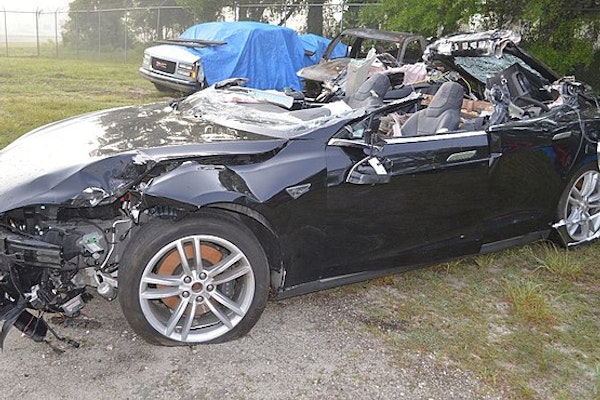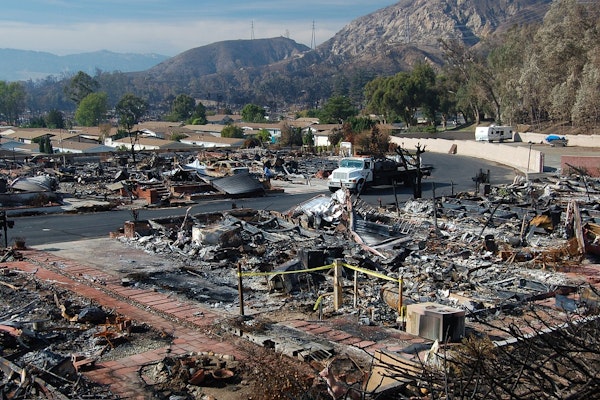
AI Wildfire Detection Bill Gets Initial Approval In Colorado
A year after the most destructive wildfire in the state’s history scorched nearly 1,100 homes, Colorado lawmakers are considering joining other Western states by adopting artificial intelligence in the hopes of detecting blazes before they burn out of control.
January 27, 2023
Legislation & Regulation
Technology
Colorado

A Moment Of Truth For Tesla
It’s a sign of the times at Tesla that I need to specify which issue is the moment of truth that I refer to in the headline. I’m not talking about the high-profile lawsuit that began last week into whether CEO Elon Musk owes damages to investors who bought stock in 2018 when he tweeted, falsely, that he had "funding secured" to take the company private.
January 24, 2023
Auto
Fraud
Technology

This Is Your Tesla Crash Mega Thread
We’ve been following the spate of Tesla Full Self Driving (FSD) and Autopilot crashes with some interest and more than a little ire.
January 18, 2023
Auto
Technology

An On-Ramp To Digital Auto Claims
The insurance industry has long sought a solution to address the lengthy and costly delay between the time of accidents and the notification of a claim, also known as FNOL (first notice of loss).
January 9, 2023
Auto
Technology

Insurtech Innovation In The Metaverse
The metaverse will offer new forms of immersive entertainment, modes of social interaction, and opportunities for collaboration. It is also expected to generate tremendous economic value.
January 9, 2023
Legislation & Regulation
Technology

Insurance Technology’s Ugly Legacy
Insurance used to be a people business, but the legacy of insurance technology tells a different story. Despite a decade-long focus on digital transformation, those projects don’t seem to have had a profound impact on the insurance ownership gap, which is widening across insurance segments and projected to reach $1.86 trillion by 2025, according to PwC.
December 30, 2022
Technology

How To Stop Claims Leakage
Inefficiency and ineffectiveness in an insurance claims department are a bit like a boat at sea that has a hole in the hull and is taking on water. The skipper is trying to move forward, but the leak keeps slowing it down.
December 28, 2022
Technology

The Great Resignation Is Straining Workers’ Comp And Bodily Injury Claims Teams
Last year, 56% of insurance companies planned to increase their staff within the next 12 months, per an Insurance Information Institute report.
December 21, 2022
Liability
Technology
Workers' Compensation

Outsourcing 2.0 To The Rescue
Outsourcing has moved front and center as the P&C industry transforms to manage today’s new realities, but it has become much more sophisticated.
December 20, 2022
Insurance Industry
Technology

Technology and Racial Bias: Study Backs Lawsuit Against Insurer
Jacqueline Huskey, a Black woman living in suburban Illinois, tried more than a dozen times to get help from State Farm after a hailstorm punched holes in her roof. Now, thanks to a broad study of how the insurer handles claims like hers, she has evidence indicating that her struggle is a common one for Black customers.
December 15, 2022
Litigation
Property
Technology

How Video Fast-Tracks Underwriting, Claims
A bright spot for small business insurers: Customer trust is on the rise. Fifty percent of small business owners trust their carriers more than they did pre-pandemic. That number jumps to 80% when the business owner has filed a claim
December 9, 2022
Fraud
Property
Technology
Underwriting

JIF 2022 Climate Panel Focused On Wildfire Risk
Climate risk figured prominently throughout Triple-I’s Joint Industry Forum last week -- from the impact of severe weather events on insurers’ loss ratios to its significance in terms of changing risk profiles and to Florida homeowners’ insurance crisis.
December 6, 2022
Catastrophe
Technology
Underwriting

Stalled Claims Could Benefit From These Tech Innovations In Workers’ Comp
The medical management picture for workers’ comp has become increasingly complicated as the industry reckons with the forces of a post-pandemic world and the changing nature of work, but the problems remain the same: supporting injured workers to drive return-to-work.
November 29, 2022
Technology
Workers' Compensation

Can Insurers Connect To The Connected Car?
Today, more cars than ever are connected, and those connected cars are creating and transmitting a lot of data. This, in turn, has created a gold rush among automobile manufacturers (aka OEMs), insurers and others to find ways to monetize that data. For personal auto insurers, the stakes are greater than ever.
November 29, 2022
Auto
Technology

Resistant AI, Claim Technology Partner to Stop Fraudulent Insurance Claims
Resistant AI will deploy its AI-powered anti-fraud technology into InsurTech specialists Claim Technology to help it protect against fraudulent insurance claims.
Through this partnership, claims handlers will have the tools to spot forged documents to a level of forensic analysis that is impossible to detect with the human eye.
November 28, 2022
Fraud
Technology
Through this partnership, claims handlers will have the tools to spot forged documents to a level of forensic analysis that is impossible to detect with the human eye.





